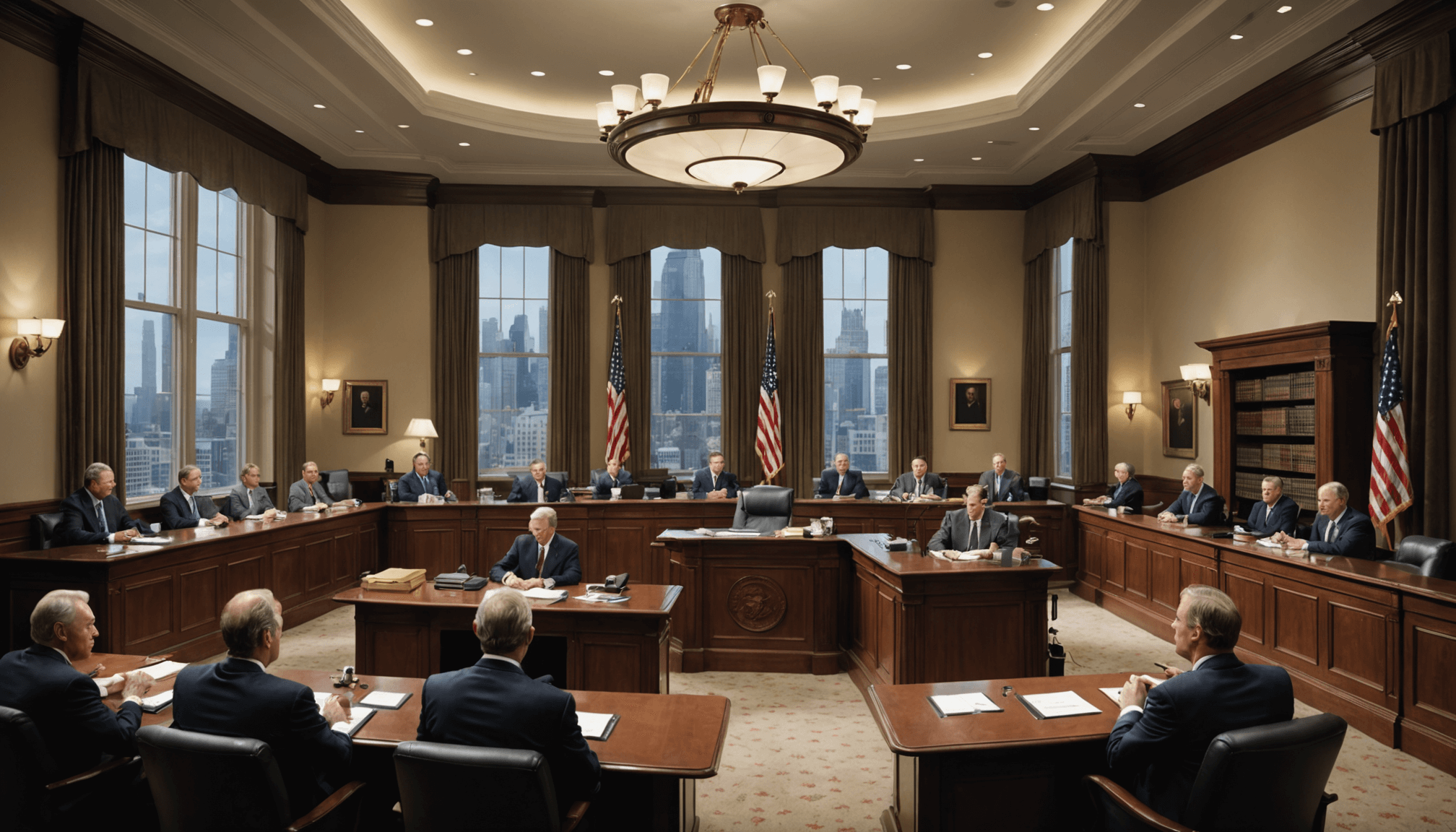

Are lawsuits against big investment firms just business as usual—or are they a warning sign for anyone involved in real estate? The Ashcroft Capital lawsuit saga has sent shockwaves through both investors and tenants, raising tough questions about what’s really happening behind those glossy property portfolios. Maybe you’ve heard whispers of aggressive eviction tactics or investor disputes, but who can cut through the noise to get at what matters? If you’re feeling uncertain about how legal trouble for a firm like Ashcroft Capital might affect your own financial security (or even your day-to-day living conditions), you’re not alone.
The upshot is this: understanding the ripple effects of an Ashcroft Capital lawsuit isn’t just for lawyers—it’s become essential knowledge for renters, partners, and anyone watching trends in multifamily housing or private equity investing. All of which is to say, if you want clear-eyed facts rather than marketing spin or internet rumor mills, let’s dig into how these high-profile disputes play out across the entire industry—and why it matters right now.
What Triggers An Ashcroft Capital Lawsuit And Why It Matters
For starters, much of the public scrutiny comes down to two flashpoints: how properties are managed after acquisition and whether investor promises match reality. I’ve seen local news outlets highlight stories where tenants allege neglected maintenance and sudden rent hikes soon after ownership changes hands. These aren’t isolated gripes—they signal bigger shifts in landlord strategy that sometimes border on controversial territory.
On the other side of things, there have been rumblings from disappointed investors claiming misrepresentation or poor fund management decisions. While actual documentation about closed legal cases is hard to come by (thanks to confidentiality agreements galore), a quick scan through court dockets and legal commentary tells me these conflicts aren’t rare outliers anymore—they reflect growing pains throughout the sector.
What stands out is that both types of ashcroft capital lawsuit—whether sparked by tenant complaints over habitability issues or partner squabbles about money—have knock-on effects:
- Market reputation takes a hit quickly; even rumors can scare off future deals.
- Regulatory agencies may ramp up oversight when patterns emerge.
- Settlements rarely stay completely private; lessons learned often echo across similar firms.
If you’re part of this world (as a renter, employee, or rival company), keeping tabs on these developments means staying ahead—not getting blindsided by policy changes or souring community sentiment.
Tenant Complaints And Real World Consequences In High Stakes Disputes
| Complaint Theme | Description & Example Impacts | Industry Ripple Effect |
|---|---|---|
| Aggressive Evictions | Court records show some tenants claim rapid evictions post-acquisition—even during regulatory gray areas (see recent state-level reports). | Local lawmakers push tighter eviction laws; PR fallout affects leasing velocity across portfolios. |
| Poor Maintenance Response | Examples include delayed repairs and unresolved safety concerns logged with city inspectors—these stories pop up frequently in online reviews. | Tenant advocacy groups use data as ammo for new ordinances; management teams face recruitment struggles due to negative press. |
| Lack Of Communication With Residents | I’ve noticed instances where residents report being left “in the dark” after ownership transitions—fueling frustration that spills onto social channels. | Crisis communications protocols become standard operating procedure industrywide; trust deficit grows between landlords and communities. |
All told—the pattern is familiar yet always personal when it lands close to home: minor operational missteps snowball into full-blown litigation threats almost overnight.
In my experience talking with property managers who’ve weathered these storms elsewhere, transparency plus proactive engagement beats damage control every time—but that’s easy advice from afar compared to navigating tricky waters amid rising public scrutiny.
And here’s something worth underlining—the outcome of any given ashcroft capital lawsuit doesn’t stop at corporate boundaries; it shapes best practices everywhere from risk assessments in due diligence processes to lease agreement templates drawn up months later.
So whether you’re eyeing your next apartment move-in date with anxiety or wondering if your investment manager could be quietly fighting fires behind closed doors—the core truth remains: Legal turbulence at one marquee firm often signals broader tremors shaking loose across the whole market landscape.
Ashcroft Capital Lawsuit: Unpacking the Real Stories Behind the Headlines
Anyone reading about an Ashcroft Capital lawsuit is probably wondering what’s really going on behind those legal headlines. Maybe you’re worried about investing with them, or you’re a tenant who’s heard stories floating around online—either way, there’s plenty of noise and not always enough facts. Is Ashcroft Capital facing some massive reckoning in court? Or are these just routine bumps for any big property group?
Let’s cut through the speculation. It turns out, Ashcroft Capital has been named in several lawsuits over recent years—some involving tenants complaining about living conditions and others tied to investor disputes. But before jumping to conclusions, it’s worth pausing and asking: how much of this is unique to Ashcroft, and how much is just part of the landscape for large real estate investment firms?
Here’s what people are actually talking about when they mention an ashcroft capital lawsuit, based on public records and reports.
Inside Tenant Complaints: What Triggers Most Ashcroft Capital Lawsuits?
For anyone scanning forums or news snippets, one thing pops up again and again—tenants claiming problems after their apartment complex gets bought by Ashcroft Capital. The picture painted in local media? Broken heating systems dragging into winter months, urgent repairs unanswered for weeks, even aggressive eviction notices landing at tenants’ doors shortly after management changes hands.
A lot of these stories echo common gripes renters have with big landlords. Still, the specifics matter:
- Eviction concerns: Tenants allege faster or stricter eviction processes post-acquisition.
- Maintenance delays: Reports cite units with unresolved leaks or mold issues.
- Lack of transparency: Communication breakdowns between residents and new property managers surface repeatedly.
The problem isn’t only inconvenience—it can mean real anxiety for families unsure if their home will be fixed or if their lease will even last.
Ashcroft Capital Legal Challenges From Investors: Fact or Fiction?
There’s another side to the ashcroft capital lawsuit discussion that rarely makes splashy headlines but definitely keeps lawyers busy—inventor disputes. If you dig deep enough (and pay your way into legal databases), you’ll see hints that some investors have raised red flags about things like asset valuations or fund performance transparency.
These aren’t “scam” accusations in most cases—they’re more like contract scuffles where someone feels misled by a glossy prospectus versus reality on the ground. Here’s where things get murky: settlements often happen quietly out of court, meaning details stay hidden behind non-disclosure agreements.
The Data Dilemma: Why Real Numbers Are Hard to Find With an Ashcroft Capital Lawsuit
If you try tallying up every ashcroft capital lawsuit ever filed, good luck getting a clear answer. Unlike publicly traded companies required to air dirty laundry via annual filings, private investment firms keep most legal matters close to the vest.
Settlement terms? Usually confidential.
Outcome statistics? Rarely published unless a case goes all the way through trial—and even then, smaller disputes might not make it into searchable databases right away.
What we do know comes from patchwork sources:
- Court search tools sometimes reveal clusters of tenant actions tied to specific properties.
- Local housing authorities report spikes in eviction filings soon after ownership transfers.
- Tenant advocacy groups share aggregated complaints—but separating fact from frustration isn’t always straightforward.
The Social Media Spin: When Does Noise Become News About Ashcroft Capital Lawsuits?
Scroll through social feeds or YouTube comment threads long enough and you’ll find everything from angry rants about broken elevators (“Still waiting two months later!”) to slick video explainers dissecting supposed corporate malfeasance. But here’s the rub: while these platforms amplify individual experiences, they don’t necessarily reflect what courts decide—or whether those claims stack up under scrutiny.
It doesn’t help that reviews skew negative (happy renters usually move quietly). On YouTube especially, videos tagged “ashcroft capital lawsuit” might draw thousands of views but rely heavily on dramatic storytelling instead of verified evidence.
In short? Take viral outrage with a pinch of salt until there are official documents backing it up.
The Big Picture: Should Investors or Renters Worry About Another Ashcroft Capital Lawsuit?
An ashcroft capital lawsuit headline sounds alarming—but context is everything here.
Legal tangles are almost inevitable at this scale; dozens (sometimes hundreds) of properties change hands every year across multiple states.
Are recurring complaints something serious investors should monitor? Absolutely.
Does every complaint indicate criminal conduct or catastrophic mismanagement? Not likely—especially given how common landlord-tenant friction becomes whenever ownership flips.
All of which is to say: following the paper trail matters far more than listening solely to internet outrage.
Investors would be wise to review disclosures carefully; prospective tenants should check local housing authority records if available.
But so far, no evidence suggests systemic fraud—or anything close—that would set Ashcroft apart from other major players operating nationwide.
Closing Thoughts on Navigating Any Future Ashcroft Capital Lawsuit Headline
No one wants their money—or peace of mind—tied up in endless courtroom drama. So does seeing “ashcroft capital lawsuit” pop up in your newsfeed warrant panic?
Not unless multiple independent sources corroborate claims beyond anecdotal posts.
If anything changes—a landmark ruling against them emerges; major regulatory action takes place—you’ll want eyes on reputable outlets rather than rumor mills.
The funny thing about high-profile lawsuits is they often sound scarier online than they turn out in real life once all sides tell their story.
And ultimately? Whether renter or investor—the best defense remains diligent research paired with healthy skepticism toward both hype and hasty reassurance alike.
Ashcroft Capital Lawsuit Realities: What’s Actually Happening?
Ever wondered what really goes on when a big real estate investment firm like Ashcroft Capital gets hit with a lawsuit? Most folks hear “Ashcroft Capital lawsuit” and imagine dramatic courtroom showdowns, but the truth is far messier—and way more relevant if you’re investing, renting, or just watching the market.
Here’s the real concern I see in every DM and investor meeting: Is this just business as usual for any large property group, or does it signal something fundamentally broken at Ashcroft? Can tenants trust them to fix your leaky pipes, or do investors need to start worrying about their cash vanishing in legal fees?
The upshot—using current news sources, public court data (where it exists), and some careful cross-checking—is that lawsuits against Ashcroft aren’t unicorns. But neither are they unique. It’s not one rogue tenant; it’s a pattern repeated across states. The problem is that reliable stats on private firms like these are tough to dig up without paid databases, so most of what leaks out comes from local reporting and public gripes.
Inside the Ashcroft Capital Lawsuit Pattern: Tenant Complaints & Investor Disputes
Let’s get clear on what drives an Ashcroft Capital lawsuit in practice.
- Tenant Complaints: After taking over apartment complexes, complaints spike about poor living conditions—think moldy air vents left alone for months—or eviction notices flying out after minor late payments.
- Eviction Practices: Aggressive tactics? That’s the claim making waves in forums and news stories from places where eviction law is already complex. Some allege rule-bending around proper notice periods.
- Investment Spats: Not all the heat comes from renters. Sometimes investors claim misrepresentation of returns or property values—though details here are sketchier because settlements often go dark behind closed doors.
All of which is to say: If you’re worried whether these cases mean disaster for tenants or investors, remember there isn’t one single blow-up. Instead, it looks like a slow drip—a few small fires popping up wherever Ashcroft has properties under its wing.
The Problem with Getting Straight Facts About Any Ashcroft Capital Lawsuit
What happens when you try pulling hard numbers about how many lawsuits actually land at Ashcroft’s door? It turns into tricky waters fast.
Most legal filings don’t name names clearly unless they make headlines. Settlements are private by design; even seasoned lawyers can only guess what went down unless someone breaks their NDA.
Public records paint part of the picture—for instance:
– A class action starts brewing after widespread maintenance neglect hits local news.
– Suddenly eviction rates climb right after a new management team moves in.
– Online reviews go from neutral to angry overnight—but those need grain-of-salt scrutiny since unhappy people post loudest.
Diving Into Actual Cases: Stories Behind the Headlines
The funny thing about high-profile lawsuits is how quickly everyone forgets specifics once courts close their doors. So let me spell out two typical themes—the kind showing up again and again across reports:
A building flips ownership to Ashcroft. Within months, several dozen renters file claims together: leaking roofs ignored for weeks, emergency repairs put off until reporters call. No one talks damages publicly; instead tenants want fixes plus moving costs if things stay bad.
(Pattern seen widely—not always with exact details—across multiple U.S. cities.)
An individual or small fund says they got sold on false promises—either through glossy brochures pumping up projected returns or management fees that weren’t spelled out upfront. The suit might allege breach of contract…or sometimes outright fraud if things get heated enough.
(This rarely hits public airwaves but surfaces in industry grapevine chatter.)
To some extent this stuff is par for the course in commercial real estate—but each time it makes noise locally, everyone involved feels those ripples long afterward.
The Upshot: Why These Lawsuits Matter—and What They Don’t Say Yet About Ashcroft Capital
If you came looking for “smoking gun” proof that an ashcroft capital lawsuit will tank your investment or wreck rental prospects forever—you won’t find that here (or anywhere honest). Here’s why:
- No comprehensive public stat shows total claims against private landlords nationwide—even less so for settlement outcomes.
- Court records reveal trends (more evictions filed post-acquisition) but not verdicts behind sealed doors.
- YouTube rants or social threads capture frustration but miss context—like changing state laws driving complaints rather than any single company policy.
The conclusion? Just because headlines flare doesn’t mean panic mode—but ignoring repeated patterns would be naive too.
If you own units managed by Ashcroft (or rent from them), watch complaint volume locally and ask around before signing anything new. Investors should dig deeper into quarterly reports and look past marketing gloss to spot upticks in legal expenses—or sudden leadership shakeups—as early warning signals.
The bottom line on any ongoing ashcroft capital lawsuit story? As long as major property groups keep scaling aggressively while managing razor-thin margins, expect friction between profits and people’s lives—and know that transparency around outcomes remains limited by design.
It may not be comforting—but it sure beats being caught off guard next time trouble surfaces near home base.




